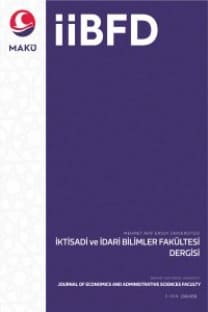YOLSUZLUK VE MUHASEBE KALİTESİ İLİŞKİSİ
Yolsuzluk Endeksi, Düzeltilmilş Jones Modeli, Muhasebe Kalitesi
RELATIONSHIP OF CORRUPTION AND ACCOUNTING QUALITY
___
- Alam, M. (1995). A Theory of limits on corruption and some applications. Kyklos, 48(3), 419-35.
- AliShah, S. Z., Butt, S. A. ve Hasan, A. (2009). Corporate governance and earnings management an empirical evidence form pakistan listed companies. European Journal of Scientific Research, 26(4), 624–638.
- Athanasouli, D. ve Goujard, A. (2015). Corruption and management practices: firm level evidence. J Comp Econ, 43(4), 1014–1034.
- Barth, M. E., Landsman, W. R. ve Lang, M. H. (2008). International accounting standards and accounting quality. Journal of Accounting Research, 46(3), 467-498.
- Biddle G. C. ve Hilary G. (2006). Accounting Quality and Firm- Level Capital Investment. Accounting Review, 1-40. Erişim 20 Eylül 2020, http://papers.ssrn.com/sol3/papers.cfm?abstract_id=910806
- Can, A. V. (2010). Krizin muhasebesi ve muhasebenin krizi. Mali Çözüm, 97, 21-48.
- Chaney, P. K., Faccio, M. ve Parsley, D. (2011). The quality of accounting information in politically connected firms. J Account Econ, 51(1-2), 58–76
- Chen, H., Tang, Q., Jiang, Y. ve Lin, Z. (2010). The role of international financial reporting standards in accounting quality: evidence from the european union. Journal of International Financial Management and Accounting, 21(3).
- Cuervo-Cazurra, A. (2016). Corruption in international business. Journal of World Business, 51(1), 35-49.
- Dechow, P. M., Sloan, R. G. ve Sweeney, A. P. (1995). Detecting earnings management. The Accounting Review, 70(2), 193-225.
- Dechow, P. ve Skinner, D. (2000). Earnings management: reconciling the views of accounting academics, practitioners and regulators. Accounting Horizons, 14(2), 235-250.
- Dechow, P. M. ve Schrand, C. M. (2004). Earnings Quality. Charlottesville, VA: Research Foundation of CFA Institute.
- Demerjian, P. R., Lev, B., Lewis, M. F. ve McVay, S. E. (2013). Managerial ability and earnings quality. Account Review, 88(2), 463–498.
- Ertan, Y. (2011). Türkiye Muhasebe Standartlarının Denetim ve Muhasebe Kalitesi Üzerindeki Etkisi: Bir Uygulama. Doktora Tezi, Uludağ Üniversitesi.
- Everett, J., Neu, D. ve Rahaman, A. S. (2007). Accounting and the global fight against corruption. accounting, Organizations and Society, 32(6), 513-542.
- González, J. S. ve García-Meca, E. (2014). Does corporate governance ınfluence earnings management in latin american markets?. Journal of Business Ethics, 121, 419-440.
- Healy, P. ve Wahlen, J. (1999). A review of the earnings management literature and its implications for standard setting. Accounting Horizons, 13(4), 365-383.
- Houqe, M. ve Monem, R. (2013). Corruption, Political Institutions, and Accounting Environment: A Cross-Country Study. International Journal of Accounting Symposium, May 2013, http://dx.doi.org/10.2139/ssrn.2263630
- Houqe, M. ve Monem, R. (2016). IFRS Adoption, extent of disclosure, and perceived corruption: a cross–country study. The International Journal of Accounting, 51(3), 363-378. International Monetary Fund (IMF) (2016). IMF Survey: Fighting Corruption Critical for Growth and Macroeconomic Stability-IMF paper. http://www.imf.org/exter nal/pubs/ft/surve y/so/2016/RES05 1116A. HTML.
- Jones, J. J. (1991). Earnings management during import relief investigations. Journal of Accounting Research, 29(2), 193-228.
- Kimbro, M. B. (2002). A cross-country empirical investigation of corruption and its relationship to economic, cultural and institutional variables: an examination of the role of accounting and financial statements quality. Journal of Accounting, Auditing and Finance, 17(4), 325-349.
- La Porta, R., Lopez De Silanes, F., Shleifer, A. ve Vishny, R. (1998). Investor Protection and Corporate Valuation. NBER Working Paper. No 7403, Erişim 10 Nisan 2020, ftp://all.repec.org/RePEc/fth/harver/hier1882.pdf
- Lindahl, F. ve Schadéwitz, H. (2008). Accounting Quality and the Law. Erişim 15 Eylül 2020, http://papers.ssrn.com.sol3/papers.cfm?abstract_id=1275971
- Lindahl, F. ve Schadéwitz, H. (2018). Accounting quality in eastern europe after communism. Journal of East-West Business, 24(1), 24-49.
- Lourenço, I., Rathke, K., Santana, V. ve Branco, M. (2018). The effects of corruption on earnings management. corporate governance: the international Journal of Business in Society, 18(1), 35-51.
- Malagueño, R., Albrecht, C., Ainge, C. ve Stephens, N. (2010). Accounting and Corruption: A Cross Country Analysis. Journal of Money Laundering Control, 13(4), 372–393.
- Platikanova, P. ve Perroman, J. (2012). Economic consequences of the first-time ifrs introduction in europe. Spanish Journal of Finance and Accounting, 41, 497-518.
- Riahi-Belkaoui, A. (2004). Effects of corruption on earnings opacity internationally. Advances in International Accounting, 17, 73-84.
- Riahi-Belkaoui, A. ve AlNajjar, F. K. (2006). Earnings opacity internationally and elements of social, economic and accounting order. Review of Accounting and Finance, 5(3), 189-203.
- Shleifer, A. ve Vishny, R. (1993). Corruption. The Quarterly Journal of Economics, 108(3), 599-617.
- Soderstrom, N. S. ve Sun, K. J. (2007). Ifrs adoption and accounting quality: a review. European Accounting Review, 16(4).
- Umobong, A. A. ve Akani, D. (2015). Ifrs adoption and accounting quality of quoted manufacturing firms in nigeria: a cross sectional study of brewery and cement manufacturing firms. International Journal of Business and Management Review, 3(6), 61-77.
- Wu, X. (2005). Firm accounting practices, accounting reforms and corruption in asia. Policy and Society, 24(3), 53-78.
- Verluen, M., Georgakopoulos, G., Sotiropoulos, I. ve Vasileiou, K. Z. (2011). The sarbanes-oxley act and accounting quality: a comprehensive examination. International Journal of Economics and Finance, 3(5).
- ISSN: 2149-1658
- Yayın Aralığı: Yılda 3 Sayı
- Yayıncı: Mehmet Akif Ersoy Üniversitesi İktisadi ve İdari Bilimler Fakültesi
CRITIC YÖNTEMİ VE OYUN TEORİSİ BÜTÜNLEŞİK YAKLAŞIMI İLE HASTANE PERFORMANSLARININ DEĞERLENDİRİLMESİ
Nuri ÖMÜRBEK, Hatice YILDIRIM, Gülen PARLAR, Meltem KARAATLI
HİLELİ FİNANSAL RAPORLAMA KAPSAMINDA GELİR YARATICI / GİDER AZALTICI FAALİYETLERİN İNCELENMESİ
Murat ERDOGAN, Eda ORUÇ ERDOĞAN
YÜKSELEN EKONOMİLERDE EKONOMİK KALKINMA VE DEMOKRASİ
REKABET STRATEJİLERİNİN ÖRGÜTSEL PERFORMANSA ETKİSİ, GİRİŞİMCİLİĞİN ARACILIK ROLÜ
Özgür Uğur ARIKAN, Abdullah ÇALIŞKAN
STRATEJİK LİDERLİK İLE ÖRGÜTSEL ÇEVİKLİK ARASINDAKİ İLİŞKİDE ÖRGÜTSEL İLETİŞİMİN ARACI ROLÜ
Fatih Ferhat ÇETİNKAYA, Yusuf AKKOCA
TÜRKİYE’DE KENTSEL HAKLAR: SOSYAL DEVLET BAĞLAMINDA KONUT HAKKI ÜZERİNE BİR İNCELEME
YOLSUZLUK VE MUHASEBE KALİTESİ İLİŞKİSİ
Emin Hüseyin ÇETENAK, Eda KÖSE, İsmail BEKCİ
AKDENİZ ÜLKELERİNDE TURİZMİN EKONOMİK BÜYÜMEYE ETKİSİ: SAKLI PANEL EŞBÜTÜNLEŞME TESTİNDEN KANITLAR
Murat BELKE, Süleyman BOLAT, Abdulnasser HATEMİ-J
REKABETÇİ DAVRANIŞLARIN STRATEJİ YÜRÜTME ÜZERİNDEKİ ETKİSİ: OTOMOTİV SEKTÖRÜ ÜZERİNDE BİR UYGULAMA
